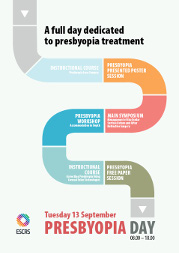Evaluation of a new hydrophilic acrylic supplementary IOL for sulcus fixation in pseudophakic cadaver eyes
Session Details
Session Title: Pseudophakic IOLs: Monofocal/Accommodative
Session Date/Time: Tuesday 13/09/2016 | 16:30-18:00
Paper Time: 16:30
Venue: Hall C2
First Author: : L.Werner USA
Co Author(s): : N. Reiter J. Guan J. Li K. Tsaousis N. Mamalis S. Srinivasan
Abstract Details
Purpose:
To evaluate for the first time a single-piece hydrophilic acrylic intraocular lens (IOL) designed for supplementary sulcus fixation in postmortem pseudophakic human eyes.
Setting:
John A. Moran Eye Center, University of Utah, Salt Lake City, UT, USA
Methods:
This is an experimental study using pseudophakic human cadaver eyes, which were imaged by anterior segment optical coherence tomography (AS-OCT) to assess position of the primary, in-the-bag IOL. All eyes were prepared as per the Miyake-Apple technique. The supplementary IOL (Medicontur A4 Addon IOL family) was then inserted into the ciliary sulcus. AS-OCT and photographs from anterior and posterior views were used to assess IOL centration, tilt, and interlenticular distance from the primary IOL.
Results:
Data was obtained from 12 eyes having primary IOLs of varying materials and designs in the bag and representing different sizes of eyes and severity of Soemmering’s ring formation. The A4 Addon IOL was successfully inserted into the ciliary sulcus and was well centered in all cases. Four cases of tilt were observed on AS-OCT: three with mild tilt due to pre-existing zonular dehiscence, and one due to a localized area of Soemmering’s ring formation. Interlenticular distance ranged from 0.34-1.24 mm and was not dependent on severity of Soemmering’s ring or type of primary IOL.
Conclusions:
The A4 Addon IOL was designed for sulcus fixation as a supplementary lens, with a large diameter and a square-shaped optic to exclude pupillary capture, and 4 smooth loop haptics and convex-concave optical surface to minimize pigment dispersion syndrome. It exhibited appropriate centration and interlenticular distance with different primary in-the-bag IOLs.
Financial Disclosure:
... research is funded, fully or partially, by a company producing, developing or supplying the product or procedure presented





